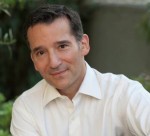Rabbi David Wolpe joins FEDtalks on Sept. 17 at Queen E. Theatre. (photo from Facebook)
When the man Newsweek calls the most influential rabbi in America gets up to speak in Vancouver this month, he may be as surprised as the audience by what he has to say.
“I really never know exactly until I get up to speak,” said Rabbi David Wolpe, who will be here Sept. 17 as one of four speakers at FEDtalks, the annual campaign launch of the Jewish Federation of Greater Vancouver. “I do this somewhat spontaneously and it will depend somewhat on what I hear the other people say because I don’t want to repeat what they would say.”
His talk, Inspiring Jewish Life, will address “something about the way in which our efforts have surprising and unanticipated consequences both in our community and in the world,” he told the Independent in a telephone interview.
Wolpe has also been dubbed one of the 50 most influential Jews in the world by the Jerusalem Post. He is the author of eight books, including the bestseller Making Loss Matter: Creating Meaning in Difficult Times. His most recent book, David, the Divided Heart, was a finalist for the National Jewish Book Awards. He has taught at the Jewish Theological Seminary of America in New York, the American Jewish University in Los Angeles, Hunter College and UCLA. He is a prolific writer and commentator.
Wolpe is the rabbi of Sinai Temple in Los Angeles, of which about half of the congregation are Jews of Iranian origin, which gives him an acute perspective on the nuclear deal between Iran and the P5+1 world powers.
“I would say in the Iranian Jewish community in L.A., the consensus is fairly strong against the deal,” he said. “It’s not unanimous, but it’s fairly strong.”
Wolpe sees a glimmer of hope but overall fears the deal is a bad one.
“The biggest reason for optimism long term is that the Iranian population is so young … and that many of those young people don’t support the theological or political views of their leaders,” said the rabbi. “That’s the reason long term for optimism and, of course, Iran and the United States have had an alliance in the past. Maybe one day that could be renewed.
“There is plenty of reason for worry, however,” he continued. “I, myself, oppose the deal. I think most of my Iranian congregants do as well. But whoever is correct about this deal, or no deal, I think that the prospect that Iran will get a nuclear bomb is both frighteningly real and just plain frightening.”
Wolpe is the son of a rabbi and has been taken aback by the persistence of global antisemitism across generations.
“When I started out in the rabbinate, I really did believe that, unlike my father’s rabbinate … antisemitism wasn’t going to be the theme of Jewish life anymore,” he said. “I really thought that. I thought it was on the wane. So, the resurgence through Europe is disheartening and pretty scary.”
Wolpe traveled in Europe this summer and sees little reason for optimism. “I wish I did,” he said. “The mood in Europe is very pessimistic.”
He believes that the United States is relatively well inoculated against antisemitism.
“Unlike the countries of Europe, the United States did not have an identifiable majority and minority,” he said. “Most antisemitism arose when there were the French and the Jews, the Germans and the Jews, the Russians and the Jews. The Jews were the clear, identifiable minority in most of these countries. That’s not true in America. We are a patchwork of minorities and, as a result … to be a Jew is not to be the one who stands out as being different.… America has historically not been a place that is hostile to Jews. Are there antisemitic acts? Yes. But I don’t see any serious signs that [tolerance toward Jews is] changing or threatens to change.”
Wolpe will be speaking at the event during the Days of Awe and said it is a good time to reflect on the positive.
“Rosh Hashana is really about our sense of gratitude, about the gift of everything that we have because we are showered with blessings,” he said. “Even though we focus on all the dangers and difficulties of our lives, we are just bursting with wonderful and extraordinary and often unprecedented blessings in our lives.”
For more information about and tickets to FEDtalks, visit jewishvancouver.com. Interviews with the three other speakers appeared in previous issues of the Independent: Irwin Cotler, Dafna Lifshitz and Eli Winkelman.

